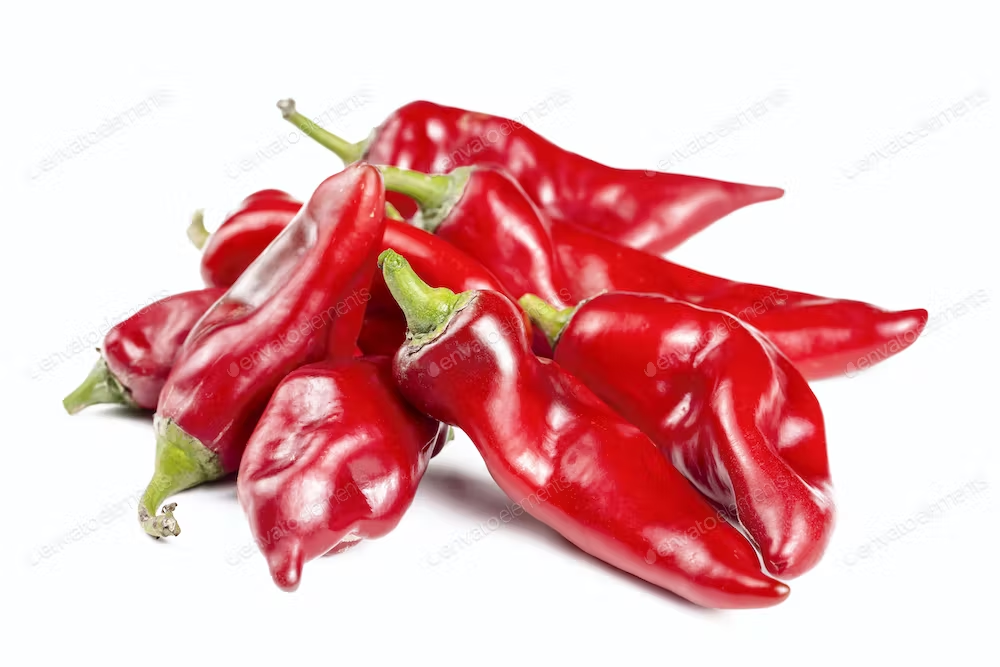
Red peppers, such as chilli pepper, are a type of fruit and vegetable. They are usually red, and spicy, and can be eaten raw, cooked, or made into sauce. They are used in many dishes, such as pizza, pasta, and chilli.
Many people prefer to eat red bell pepper because they taste good. But did you know they can help your body? Red peppers contain a lot of vitamins, antioxidants and nutrients that are very important for your health.
Vitamins and Minerals Found in Red Peppers
Vitamin C
Vitamin C is abundant in red peppers. In fact, a one-ounce serving of red pepper contains about 47% of the recommended daily intake (RDI) for vitamin C.
The health benefit of consuming vitamin C from red peppers include reducing the risk of colds and infections, improving overall immunity, and fighting cancer. It is helpful to have a healthy diet.
Vitamin A
Vitamins A is important for your health because it helps improve eye health by forming a retina in your eye, regulating your body’s immune system, and supporting healthy skin and hair.
Besides its health benefits, vitamin A from bell peppers can also help improve your vision. This is because vitamin A helps form the light-sensitive cells in your eyes. If you’re deficient in vitamin A, eating a bell pepper can help to fill that gap and support your overall health.
Vitamin B3 (Niacin)
The red pepper contains vitamin B3, also known as Niacin, which is a crucial nutrient for your body. It helps to improve your immune system, blood circulation, and energy levels. Vitamin B3 is known for its anti-inflammatory properties and helps to maintain good health.
Vitamin B2 (Riboflavin)
Vitamin B2, or Riboflavin, is essential for your body. It is a fat-soluble vitamin that helps your body to produce energy and maintain healthy cells. It’s also an essential part of neurotransmitters, which are molecules that send impulses between the brain and muscular nerve cells.
Vitamin B9 (Folate)
Vitamin B9 are also available in red peppers. Folate is a water-soluble vitamin that is essential for the body. It helps produce red blood cells, which carry oxygen around the body. The main function of Vitamin B9 is to help your body produce energy.
Vitamin B6 (Pyridoxine)
Pyridoxine usually referred to as vitamin B6, is a water-soluble vitamin essential for the body’s metabolic processes. Many foods contain it, including red peppers.
The health benefits of consuming Vitamin B6 from red peppers include helping to improve mood and cognitive function, reducing inflammation and pain, helping to keep your skin healthy, and aiding in the formation of DNA.
Vitamin K
A good source of vitamin K is red bell peppers. This vitamin is essential for the body to create proteins and other important molecules. Vitamin K helps the body form proteins needed for blood clots, prevents cancer, and supports bone health. According to several research, eating red bell peppers may help lower blood pressure, protect against osteoporosis, and enhance heart health.
Calcium
Red peppers are a good source of calcium. A cup of chopped red peppers has 128 milligrams of calcium, representing more than half of the adult daily recommended consumption. The high amount of calcium in red peppers may help to improve your health by helping to maintain strong bones and teeth.
Iron
Iron is a mineral that is essential for the body to function properly. It is crucial for producing energy, growth and repair of cells.
The most common way to get iron in your diet is from red peppers. Iron is found in many forms, but it is mainly present as iron oxide (rust). When you cook red pepper with water or oil, this rust turns into iron oxide crystals (iron sulfide). Iron sulfide can be dissolved in water or used as a supplement to your diet.
Potassium
Potassium is also one mineral found in red peppers. It is an important mineral that helps maintain heart health, muscle function, and nerve conductivity. It is also beneficial for pregnant women because it helps to prevent preeclampsia. Potassium can help reduce the risk of stroke, high blood pressure, and other cardiovascular diseases.
Magnesium
Magnesium is an essential mineral that helps keep your heart and muscles working properly. It helps relieve anxiety, tension headaches, and muscle cramps.
This nutrient is also important for keeping your bones strong and preventing diabetes. Red peppers are a good source of magnesium since they contain a lot of vitamin C, which helps improve magnesium absorption.
Beta-carotene
Peppers are a good source of Beta-carotene, a type of antioxidant. Antioxidants help your body protect itself against damage caused by free radicals. Free radicals are atoms and molecules that have been freed from their usual chemical restraints and can cause damage to cells and DNA.
The health benefits of beta-carotene include reducing the risk of cancer, improving vision, preventing heart disease, and more.
Conclusion

Red peppers are a member of the capsicum family, and like all capsicums, they are a good source of Vitamin C and minerals.
- They are also a good source of folate, potassium, magnesium, vitamin B6, beta-carotene, iron, calcium, vitamin A, vitamin K, niacin, and riboflavin.
- Nutrients in red peppers can help to maintain a healthy heart and circulatory system, as well as keep the skin healthy and free from wrinkles.
- Vitamin C can help protect your cells from damage, Niacin can help improve heart health, and Vitamin B6 can support cognitive function.
- Red peppers contain antioxidants that protect the body from damage caused by free radicals.
- They have a low sugar content and calorie count. It can be eaten fresh, canned, or frozen.
- Besides their health benefits, red peppers contribute flavour to dishes.
Was this article helpful? Let us know!
FAQs
Which colour bell pepper is the healthiest?
Red peppers are the healthiest because they have been on the vine for the longest time. Green pepper is harvested earlier than yellow, orange, and red. In comparison with green bell pepper, red bell pepper contains almost 11 times as much beta-carotene and 1.5 times as much vitamin C.
Is pepper an anti-inflammatory food?
Red bell peppers, especially those that are bright red, have high powerful antioxidant levels and low starch levels. Capsaicin, the chemical compound in sweet bell peppers, is like capsaicin in spicy peppers, which reduces inflammation and possibly even pain.
What is the best way to eat bell peppers? Raw or cooked?
Red peppers are best eaten raw because, during the cooking process, the vitamin C content is depleted due to heat.











